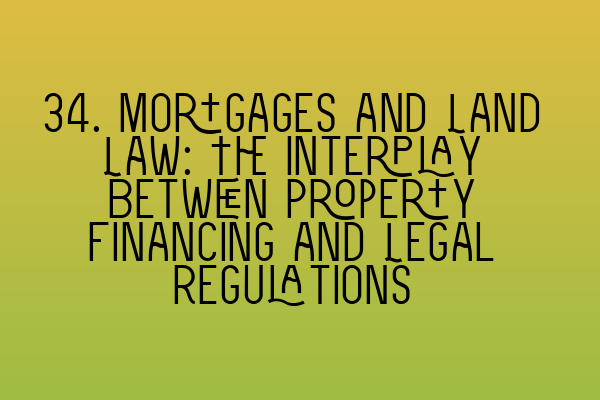34. Mortgages and Land Law: The Interplay Between Property Financing and Legal Regulations
Welcome to the blog of SQE Property Law & Land Law. In this article, we will explore the fascinating world of mortgages and their interplay with land law. Mortgages play a crucial role in property financing, allowing individuals and businesses to secure loans against their properties. Understanding the legal regulations surrounding mortgages is essential for both solicitors and property owners alike. So, let’s dive right in!
What is a Mortgage?
A mortgage is a legal agreement between a lender, typically a bank or financial institution, and a borrower, where the borrower uses their property as collateral to secure a loan. This allows borrowers to access funds for various purposes, such as purchasing a home, expanding their business, or funding personal expenses.
When a borrower enters into a mortgage agreement, they transfer a legal interest in their property to the lender, known as a mortgagee. In return, the lender provides the borrower with a loan, which is usually repaid over a specified period, often accompanied by interest.
The Legal Framework of Mortgages
As solicitors practicing property law, it is crucial to have a firm grasp of the legal framework surrounding mortgages. The primary legislation governing mortgages and land law in the United Kingdom is the Law of Property Act 1925. This Act sets out the rights, obligations, and remedies available to both borrowers and lenders.
Under the Law of Property Act 1925, a mortgage can be created through two different methods: legal mortgage and equitable mortgage. A legal mortgage involves the transfer of the legal title to the lender, while an equitable mortgage does not transfer legal ownership but grants the lender a specific interest in the property.
It is essential for solicitors to advise their clients on the implications of the chosen method, as it may impact their legal rights and remedies in case of default or other disputes.
The Role of Land Registration
Land registration plays a crucial role in mortgage transactions. In the UK, land is registered with the Land Registry, which maintains an up-to-date record of property ownership and any associated interests, such as mortgages.
When a mortgage is created, it must be registered with the Land Registry to provide notice to any subsequent buyers or lenders. Registering a mortgage ensures that it is legally binding and enforceable against third parties. Solicitors must ensure proper registration to protect their clients’ interests.
Regulatory Considerations for Mortgage Transactions
As solicitors practicing property law, it is vital to be aware of the regulatory considerations surrounding mortgage transactions. The Financial Conduct Authority (FCA) regulates mortgage lenders and brokers to protect borrowers and maintain market integrity.
When advising clients on mortgage options, solicitors must ensure compliance with FCA regulations, such as conducting affordability assessments and providing accurate and transparent information to borrowers. Additionally, solicitors should stay updated with the latest FCA guidelines and requirements to provide the best advice to their clients.
Mortgage Repossession and Enforcement
In unfortunate situations where a borrower defaults on their mortgage repayments, lenders have the right to repossess the property and enforce their security. This process, known as mortgage repossession, involves various legal considerations.
As solicitors, it is our responsibility to guide our clients through the repossession and enforcement process. We ensure compliance with legal obligations and protect the rights of both borrowers and lenders. Awareness of the relevant legislation, such as the Consumer Credit Act 1974 and the Civil Procedure Rules, is crucial to effectively handle mortgage repossession cases.
The Importance of Professional Advice
Given the intricate nature of mortgages and their legal implications, seeking professional advice is essential. Whether you are a property owner or a solicitor assisting clients, understanding the interplay between property financing and legal regulations is vital. Professional solicitors at SQE Property Law & Land Law have the expertise and knowledge to guide you through the complexities of mortgage transactions.
For more information on related topics, you may find the following articles helpful:
- SQE 1 Practice Exam Questions
- SQE 1 Practice Mocks FLK1 FLK2
- SQE 2 Preparation Courses
- SQE 1 Preparation Courses
- SRA SQE Exam Dates
At SQE Property Law & Land Law, our team of solicitors is dedicated to providing expert assistance and guidance on property financing and land law matters. Contact us today to discuss your mortgage requirements and ensure a smooth and legally compliant transaction.
